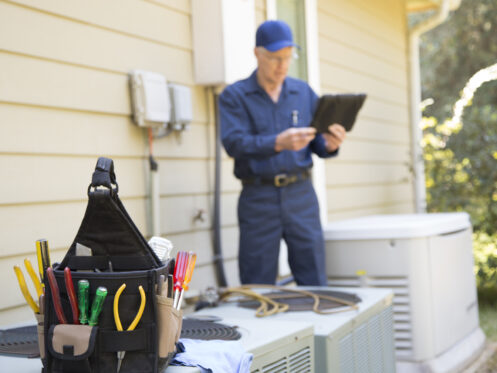Summer is when people want to enjoy what nature offers: sunshine, clear blue skies, and balmy days. However, with the heat comes the increased use of HVAC systems to stay comfortable indoors. To ensure your HVAC system is in good working condition, here are 16 easy summer HVAC maintenance tips to keep your equipment in top shape.
1. Clean the Air Filter
The air filter is an essential component of any HVAC system. It helps to trap contaminants such as dust, debris, and other particles, keeping your air conditioner running smoothly. The air filter should be checked more often and cleaned if necessary during the summer months. A dirty filter will restrict airflow and affect the quality of the air you breathe. Seek professional advice to ensure you get the most out of your AC unit. True Climate Heat + Air, an AC repair company, provides quality AC service in Edmond, OK and the Oklahoma City metro area.
2. Check for Leaks
To ensure your HVAC system is in top shape, it’s important to check for leaks. During the hot months, the refrigerant can deplete, causing the AC unit to consume more energy and perform poorly. Various factors, such as corroded coils, worn-out pipes, or simple punctures, can cause leakage. Checking for leaks regularly will prevent your HVAC system from breaking down unexpectedly and costing you more in repairs. So, before the next heat wave hits, take a few minutes to inspect your AC unit for leaks, and enjoy a relaxed summer season without any HVAC-related troubles.
3. Clean the Evaporator and Condenser Coils
Another easy tip to make a big difference in cleaning the evaporator and condenser coils. These coils absorb heat and keep the air flowing smoothly through your system. Over time, they can become clogged with dirt and debris, making it harder for your HVAC unit to function properly. By cleaning these coils regularly, you can improve system performance, reduce energy costs, and extend the lifespan of your equipment. With a few simple tools and a little know-how, it’s a quick and easy task that can save you time and money in the long run.
4. Check Refrigerant Levels
Refrigerant is the fluid your air conditioner uses to absorb heat and cool your house. Low refrigerant levels can cause your air conditioner to work harder, using more energy. Checking and topping off refrigerant levels can help to improve the system’s efficiency, saving you money and keeping things cool throughout the summer. So, if you want to avoid costly repairs and stay cool this summer, check the refrigerant levels in your HVAC system.
5. Clear Debris From Outdoor HVAC Units
The outdoor unit of your HVAC system is exposed to the elements, making it more susceptible to dust, debris, and grass clippings. These materials can significantly impact airflow, reducing the system’s efficiency and performance. Regularly cleaning the outdoor unit and clearing away any debris can improve its lifespan and reduce the risk of your HVAC unit breaking down.
6. Clean the Drain Line
Your HVAC system produces water as it cools your home during the summer, and the drainage system needs to be cleaned regularly to prevent blockages. If the drainage system is blocked, water can accumulate, leading to water damage, mold, and a musty odor. It’s advisable to have an HVAC professional inspect and clean your HVAC system’s drainage system to prevent this from happening.
7. Tighten Electrical Connections
Regularly inspecting your HVAC system‘s electrical connections and wires can prevent electrical hazards such as short circuits. Loose electrical connections can cause the HVAC system to malfunction and affect its overall performance. Professional HVAC technicians can help to tighten or repair electrical connections, ensuring your equipment operates safely and effectively during the summer months.
8. Lubricate Components
Your HVAC system’s moving parts, such as the fan and motor, require lubrication to maintain efficiency and longevity. Proper lubrication reduces friction, keeping the moving parts working smoothly and reducing the risk of breakdowns. Your HVAC technician should regularly inspect and lubricate moving parts to keep them in excellent working condition.
9. Check the Thermostat
The thermostat controls your HVAC system’s temperature and settings. It’s important to ensure it functions optimally, especially during summer when you want to keep your home cool and comfortable. Regular checks ensure the thermostat is set to the desired temperature and the HVAC system works correctly.
10. Test Capacitors
A capacitor helps the HVAC system’s motor start and run efficiently. If the capacitor isn’t working correctly, it can cause the unit to work harder, increasing the risk of damage or a break down. Capacitors can become weak or faulty, so it’s recommended to have a professional HVAC technician check them regularly.
11. Check the Blower Belt Tension
The HVAC system’s blower belt enables the fan to run, ensuring proper airflow to keep your house cool. A slack or broken belt can cause the fan to malfunction, leading to poor air quality and more cooling expenses. It would be best to have a professional HVAC technician inspect the blower belt tension regularly, ensuring it’s tightened to specification.
12. Test the Safety Controls
HVAC systems have safety controls that prevent them from operating when an issue occurs. A malfunctioning safety control can cause your system to operate unsafely, placing your home and family at risk. Regular testing of safety controls is critical to prevent emergencies and ensure the safe operation of the HVAC unit.
13. Clean Blower Assembly
Dust and debris can clog the blower assembly, reducing the airflow and quality of your HVAC system. A professional HVAC technician can disassemble and clean the blower assembly, enhancing your equipment’s air quality and performance.
14. Perform a Cooling Cycle Test
The cooling cycle test helps to determine if the HVAC system is working correctly, and it should be done annually to check for any issues that need to be addressed. During this test, the technician will turn on the cooling mode and monitor how quickly the desired temperature is reached and how long it takes to maintain it.
15. Inspection of Wiring, Gas Connections, and Valves
Ensure that the wiring, gas connections, and valves are securely connected. If these components are loose or damaged, they can cause significant damage to your HVAC system. Regular inspections should be done to check for any signs of wear and tear so that necessary repairs can be made. A professional HVAC technician can inspect and repair these components to extend the lifespan of your system.
16. Install a Dehumidifier
Consider installing a dehumidifier in your home. High humidity levels can make your house uncomfortable and lead to mold growth. A dehumidifier will help to reduce humidity levels and improve indoor air quality.
These are the most important maintenance tips for keeping your HVAC system working efficiently during the summer. Regular maintenance ensures comfort, safety, and energy efficiency in your home. To get the most out of your HVAC system, ensure it’s professionally serviced and maintained at least once a year. An experienced and reliable HVAC technician can help you to get the best results from your system while keeping your home cool and comfortable.
At True Climate Heat + Air, we offer a range of HVAC maintenance services to keep your system running smoothly and efficiently in Edmond. Our team of certified professionals will inspect and clean your system and check for potential problems. We can also provide quality plumbing solutions, including water heater installation and replacement, tankless water heater flushing and descaling, anti-scale water systems for tankless systems) kitchen and bath fixtures, and more. Contact us today for more information or to schedule an appointment.


